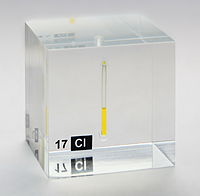
Photo from wikipedia
BACKGROUND Desirable quality estimation is an important consumer driver for wider acceptability of mixed-mode solar drying of potatoes in food industries. The aim of this study is to characterise rehydration,… Click to show full abstract
BACKGROUND Desirable quality estimation is an important consumer driver for wider acceptability of mixed-mode solar drying of potatoes in food industries. The aim of this study is to characterise rehydration, colour, texture, nanoindentaion and microstructure of dried potato samples and to establish the influence of pre-drying treatment on the above qualities. RESULTS The water absorption capacity and rehydration ability of solar dried potato were significantly influenced by pretreatment followed by rehydration temperature and sample diameter. The redness index (a*) of pretreated dried samples was lower with simultaneous higher value of yellowness index (b*), chroma (C*) and hue angle (h*). Also, the average nanohardness (H) of pretreated samples increased significantly by 22.64% compared to that of untreated samples. The average reduced modulus (Er ) and Young's modulus (Es ) of dried potato samples were 1.865 GPa and 1.403 GPa, respectively. Moreover, creep displacement of 43.27 nm was traced in the untreated potato samples during a 20 s dwell time under a constant load of 200 µN in the nanoindentation test. Micrographs revealed more uniform pore spaces in pretreated samples. CONCLUSION Pretreated, thinner potato samples achieved better quality dried products in terms of rehydration, colour, texture and nanohardness indices with significantly improved microstructure and creep resistance properties. © 2016 Society of Chemical Industry.
Journal Title: Journal of the science of food and agriculture
Year Published: 2017
Link to full text (if available)
Share on Social Media: Sign Up to like & get
recommendations!